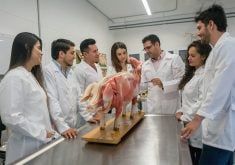SALMON ARM, B.C. – Change, adapt, change again and prepare for more change. It might sound like a disaster in many farm businesses, but Kay Carr believes that it works, provided producers don’t lose focus on their operating goals.
She and her former partner converted an 80 acre hay farm, in the dry northern end of the Okanagan Valley of British Columbia’s interior, into a viable vegetable business.
After that, Winter Greene Farm added a greenhouse, a bedding plant centre, a grocery, a commercial kitchen, a bakery and an agricultural tourism site.
Read Also

Fuel rebate rule change will affect taxes and AgriStability
The federal government recently announced updates to the fuel rebates that farmers have been receiving since 2019-20.
In the 17 year conversion process the farm went from mechanization to fully horse-powered farming and back to tractors. Each of these moves has been successful and each has been done incrementally with low debt.
“It takes a lot of planning, but once you make the decision about what you are going to do, you do it, but don’t go overboard with spending. At least until you are sure you can pay for it,” Carr said.
Her farm has been analyzed by university business programs and enjoyed by tourists, but most of all it has been profitable, she said.
“Just because something will make money doesn’t mean it’s the right choice for a farmer. I think the focus remains on moving as much of whatever it is you produce as directly as you can to the consumer. Experiences or food or anything else you can market,” she said.
“The heavy horses were the agritourism draw. Without them I expect that part of the business will come to an end, but that is OK, I’ve moved on,” she said.
Alter course
In 2001, the farm converted to Percheron power for fieldwork. However it took a dedicated individual to work with the horses both in the field and for wagon tours and sleigh rides.
“I don’t have that person doing that work anymore. I needed to change that part of the business accordingly. So I bought another tractor,” she said.
Over the years Carr has reduced the fresh produce operation. The acres of carrots and spinach had expanded, but tough competition from larger operations in British Columbia and the United States meant those crops weren’t as profitable as Carr would have liked. She still produces them, along with sweet corn, 800 tomato plants and cucumbers.
Those crops are marketed through four local farmers markets and a number of local food merchants, but Carr said she has learned competing with bigger players on anything but quality is a mistake too many producers make.
Carr also shut down a convenience store and bakery, a part of the business that grew over the years from an honour-system vegetable stand into a fresh food store with full-time staff.
“Again it could be run at a small profit, paying wages, but other areas of the business return better for the amount of resources it takes, so it needed to go,” she said.
Instead of operating those facets of her farm, Carr has chosen to expand the bedding plant business through partnership with another local grower who needed to expand.
“It makes more sense for me to operate that side of their business. I have the greenhouses, the staff. It’s a profit centre for me,” she said.
Her plants will populate the shelves of the larger retail arm of Demille Sweet Corn and Produce in Salmon Arm, as well as the outlet at the tourism facilities at the well-travelled Three Valley Gap, on the Trans-Canada Highway.
Beyond these locations she has converted a greenhouse on the farm to a bedding plant store with flowers and hanging baskets.
Carr said in a community of 15,000, goodwill is critical. She has developed an arrangement with the Rotary club to provide assembly space and low-cost flowers for an annual basket fundraiser. The local Rotary members fill 200 baskets annually to sell in the community. She also provides the flowers for the downtown municipal planters.
“Tomatoes, lettuce, cucumbers and bedding plants all produce good returns these days and that is where I’ll focus my energy.”
Carr said her next big change may be retirement from farming.
“Farming is a physical job. It’s a mental job too. At some point you have to know when it’s time to set your tools down … but only at the right price.”














